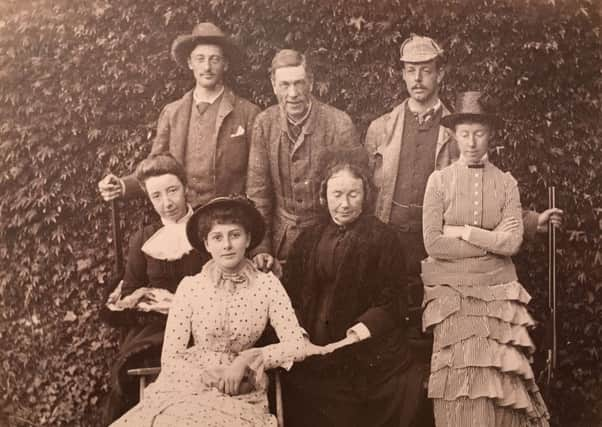How James Tait Black Memorial Prizes have rocked the literary world for 100 years – Dr Alexandra Lawrie


When Robert Graves was awarded the James Tait Black Memorial Prize for fiction in 1935 for two novels, I, Claudius and Claudius the God, he expressed his gratitude “not only for the money but for the simplicity of the thing – no prize-giving ceremony or other literary embarrassment”.
Now in their 100th year, the James Tait Black awards (one for fiction, the other for biography) are announced with a little more fanfare, at a ceremony during the Edinburgh International Book Festival in August, to which all shortlisted authors are invited.
Advertisement
Hide AdAdvertisement
Hide AdA few other things have also changed since those first years of the prize. The original bequest from Janet Coats, who established the prizes in 1918, stipulated that “the Professor of English at Edinburgh” should judge the two prizes.
These days we take a rather more democratic approach, with the academic judges relying on the help of postgraduate student readers to sift through the entries. Around two dozen students divide the 500-plus entries between them, and pass on their recommendations to the judges, who select the two shortlists and the eventual winners.
The prize money is also more substantial than it was back in 1919. The original bequest is supplemented by the university, with each of the winners awarded £10,000. We’re continually looking for ways to reward new writing now too. In 2013, the awards were extended to include a new category for drama, and this year, to mark the 100th anniversary and honour the founder of the prizes, we’re giving out a creative writing prize.
The Janet Coats Black Prize will be awarded to the best short story by a postgraduate student at the University of Edinburgh. Since 2017 we’ve also been running a MOOC (a ‘massive open online course), called ‘How to Read a Novel’, which is updated each year to draw on the new James Tait Black shortlist, and has so far had close to 30,000 participants from across the globe.
Janet Coats was a family member of the thread manufacturers J & P Coats, and established the prizes in memory of her husband, the publisher James Tait Black. The endowment explains that he was “deeply interested in the best and most educative and elevating works of literature”, and that the prizes should maintain the highest literary standards.
Since the prizes’ inception 100 years ago, the list of winners forms practically a who’s who of literary heavyweights from across the 20th century and beyond: EM Forster, Lytton Strachey, and DH Lawrence were among the first winners, back in the early 1920s.
By mid-century, the likes of Evelyn Waugh, Graham Greene, and Rose Macaulay were joining that list on the fiction side, and Antonia Fraser, Karl Miller, and Richard Ellman each won the biography prize in the years that followed. An extraordinary run of successive fiction winners in the early 1970s included Nadine Gordimer, John Berger, Iris Murdoch, and Lawrence Durrell. Since then Salman Rushdie, Caryl Phillips, Zia Haider Rahman, and Eimear McBride have joined that illustrious list.
Advertisement
Hide AdAdvertisement
Hide AdDespite being the UK’s longest-running literary prizes, with an enviable list of winning authors, the James Tait Black doesn’t grab the headlines in the same way as some of the more high-profile prizes south of the border.
Perhaps this is down to the unflashy way in which we go about judging them. In accordance with Janet Coats’ original instruction, literature academics at the University of Edinburgh, rather than celebrity panellists, choose the shortlists and eventual winners. This unique judging process, which is entirely run by English academics and postgraduate literature students (therefore those with extensive literary training, who read widely and with critical discernment) lends the prizes considerable heft.
They are widely regarded as the most literary of awards. Michael Holroyd, 2008 biography winner, explained that “it is the prize that is most valued by writers themselves”.
James Shapiro, who won the biography prize in 2016 for 1606: Shakespeare and the Year of Lear echoed these sentiments: “It’s one of the really great, great prizes... For me, it’s especially meaningful because the list of previous winners is so unbelievably distinguished.”
In its earliest days, the James Tait Black had its share of controversies. Professor Herbert Grierson, professor between 1915 and 1935, and the prize’s first judge, chose as his 1925 winner Irishman Liam O’Flaherty’s The Informer, an experimental and incendiary novel about terrorism and revolutionary violence.
When Grierson opted for Adam’s Breed, by lesbian writer Radclyffe Hall the following year, the lawyers managing Coats’ endowment started to get a little nervous. The university took over full administration of the fund in 1931, and since then has assumed full ownership of the prizes.
Over the past century, the judges have been absolutely unwavering in their commitment to rewarding writing of the highest quality. The discerning eye they bring to the task means they’re often ahead of the game.
For instance when James Kelman won the Booker in 1994 for How Late It Was, How Late, one of the judges famously threatened to resign, declaring his work “crap” and the awarding of the prize to Kelman a “disgrace”.
Advertisement
Hide AdAdvertisement
Hide AdBut his distinctive avant-garde style had already been recognised five years earlier, when he won the James Tait Black for A Disaffection in 1989. And Zadie Smith won the prize at the very start of her career for the 2000 novel White Teeth – the same year as Martin Amis won the biography prize for Experience.
The shortlists for this centenary year have been announced, with the four books on each of the shortlists reread, annotated, and argued over throughout the summer in preparation for the announcement of our 100th winners on 17 August.
Dr Alexandra Lawrie is a James Tait Black Memorial Prize fiction judge and a lecturer in English Literature at the University of Edinburgh